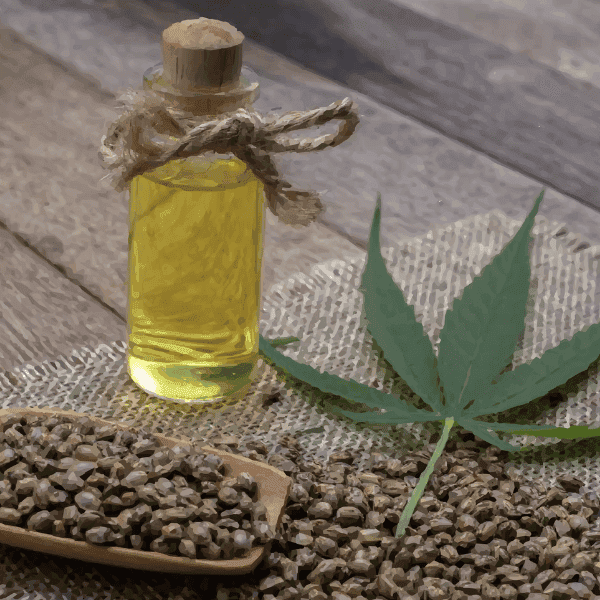
Hemp Seed Oil {Organic}
Hemp seed oil comes from the Cannabis plant. Hemp seeds are rich in essential fatty acids and may support heart, skin, and brain health. You commonly see hemp seed oil in food, supplements, and skincare.
The world of hemp has been a hot topic for many years. The use of the seeds, the plant, and the oil have been unnecessarily controversial for many years. Thankfully, we now understand the difference between the hemp plant, the seed, the oil, and the benefits that come with them.
Hemp seed oil is a type of oil extracted from the seeds of the hemp plant. It is known for its nutritional and health benefits and is widely used in various products, including foods, cosmetics, and dietary supplements.
Hemp seed oil is rich in essential fatty acids, including omega-3 and omega-6. These are crucial for maintaining heart health, brain function, and overall cellular health. It has a rich, nutty flavor, and the smell can also be nutty or earthy.
Benefits of Hemp Seed Oil
Anti-inflammatory: The fatty acids in hemp seed oil can help reduce inflammation if taken internally or applied topically.
Support skin health: The fatty acid profile has moisturizing properties, allowing it to soothe dry and irritated skin.
Antioxidants: Hemp seed oil is a great source of antioxidants, including vitamin E, Chlorophyll, phytosterols, carotenoids, and vitamin E.
Common Uses of Hemp Seed Oil
Culinary: Hemp seed oil is great in salad dressings and marinades. It does have a low smoking point and is best used with low to no heat.
Supplement: Due to the unique balance of omega-3s and 6s, many people take hemp seed oil as a supplement to support the body.
Skin Care and Cosmetics: It can be found in skin care, hair care, as well as makeup.
How it is Made
Hemp seed oil is produced through a process that involves harvesting, cleaning, and pressing the seeds of the hemp plant. Once the seeds are harvested and cleaned, they are then pressed. Cold press is the most common method for extracting hemp seed oil. Cold press helps retain the nutritional content, flavor, and natural properties of the oil. After the oil is pressed, it is filtered. This removes any foreign particles and impurities. It is then bottled and sold.
There can be additional processes after it is filtered, like refining, where the oil is heated or processed to remove flavors or colors. This can also remove some of the nutritional benefits of the oil.
Safety Concerns
Generally considered safe, if ingested in large quantities may cause gastrointestinal upset.
Drug Interaction: If you are taking prescription drugs and are worried that hemp seed oil may interaction with them, please consult a medical professional.
Breastfeeding and Pregnancy: No known contraindications during breastfeeding and pregnancy.
Select Studies about hemp seed oil
Cosmetics | Free Full-Text | Topical Use of Cannabis sativa L. Biochemicals (mdpi.com)
This study discusses the properties of hemp seed oil and how it can contribute to skin health. The fatty acids in hemp seed oil can help with dermatitis, psoriasis, and acne. The linoleic acids can reduce UV-damage and hyperpigmentation. The fatty acids can also help with hydration, contributing to its anti-aging effects.
A Review of Hemp as Food and Nutritional Supplement
Hemp is a versatile crop with low THC levels, providing food, supplements, and industrial materials while offering health benefits from compounds like CBD and nutrient-rich seeds. This review explores hemp’s nutritional, economic, and regulatory aspects worldwide.
A note about our organic hemp seed oil:
The source we use is both outdoor and sun grown.